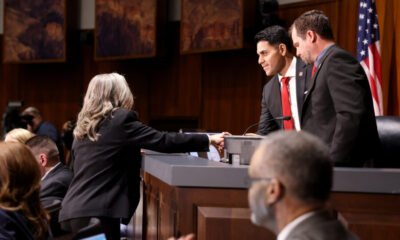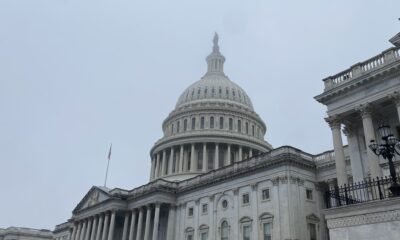Business
U.S. Senate Unites in Rare Bipartisan Move to Bolster Online Safety for Kids

Legislation aimed at bolstering online protections for children passed the U.S. Senate on Tuesday, marking a significant potential overhaul of regulations for internet companies dealing with minors, the first such update since the late 1990s.
The Senate approved the legislative package, consisting of two bills, with a 91-3 vote. The rare bipartisan support comes in the face of strong objections from civil liberties and LGBTQ advocacy groups, who argue the measures could result in subjective government censorship of online content.
Among the dissenters were Mike Lee of Utah, Rand Paul of Kentucky, and Ron Wyden of Oregon, who cast the three opposing votes.
Should the House of Representatives also pass the package, it would impose new regulations on platforms popular among youths, including rules for advertising, algorithm use, and personal data collection.
House Speaker Mike Johnson, R-La., indicated a willingness to seek a consensus on the matter within the House.
President Joe Biden endorsed the Senate vote, describing it as a “crucial bipartisan step forward,” aligning with his proposals from his first State of the Union Address. Biden highlighted the need for legislative action addressing the mental health crisis among youths, exacerbated by the unregulated online environment.
The legislative package includes the Children and Teens Online Privacy Protection Act, focusing on data collection, and the Kids Online Safety Act, which has drawn substantial criticism from various groups.
Senators behind the bill cite tragic stories from families affected by issues such as eating disorders and suicide, which they attribute to harmful online content, as the driving force behind their urgency.
Sen. Marsha Blackburn of Tennessee, a primary sponsor of the Kids Online Safety Act, emphasized the bill’s role in equipping families with tools to protect themselves from online dangers. Blackburn stressed that tech companies should no longer exploit children for profit.
Democratic Sen. Richard Blumenthal of Connecticut co-sponsored the Kids Online Safety Act with Blackburn, while Sen. Ed Markey of Massachusetts co-introduced the Children and Teens’ Online Privacy Protection Act with Republican Sen. Bill Cassidy of Louisiana. Markey likened the addictive nature of social media to tobacco products, underscoring the public health risks.
Senate Majority Leader Chuck Schumer attributed the Senate’s success to the advocacy of parents whose teens have been affected by harmful online content, highlighting the devastating impact of algorithmic addiction leading to tragic outcomes like suicide.
The merged legislative bills propose “duty of care” rules, mandating that platforms consider broad mental health concerns during development and operation. They also forbid the use of minors’ personal data for targeted marketing and require transparent privacy dashboards to manage the data.
If enacted, the Federal Trade Commission would enforce these policies, with civil actions brought by states in federal court, following FTC notification.
The bills define covered online platforms as public websites, social media, video games, messaging apps, or streaming services likely used by minors.
Snap, the company behind Snapchat, commended the Senate’s passage of the Kids Online Safety Act, reiterating their commitment to the safety and privacy of young users.
However, opposition from groups advocating First Amendment rights, privacy, and LGBTQ interests remains strong. Critics, such as Evan Greer of Fight For the Future, argue the Kids Online Safety Act could lead to undue censorship.
These critics are particularly concerned about the act’s “duty of care” clause, which mandates companies mitigate harms related to mental health. They believe this provision could lead to overreach and misuse by future administrations.
The ACLU facilitated a lobby involving 300 teens against the legislation. Dara Adkinson of TransOhio expressed fears that such regulations could censor important information, exacerbating existing anxieties around topics like climate change and American history.
Evan Greer suggested that a drastically revised version of the Kids Online Safety Act, one focusing on regulating corporate practices rather than content, would be more acceptable. Greer emphasized the importance of not conflating censorship and privacy measures.


















